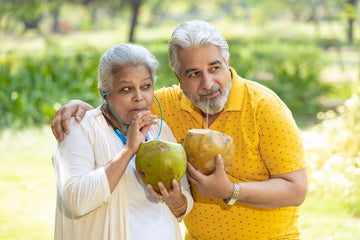Nutrition for Older Adults: Tips for Eating Healthy During the Festive Season
Oct 07, 2024

The festive season, especially during Dussehra, Diwali and Navratri, brings joy, family gatherings, and a plethora of delicious food. However, for older adults, it also presents the challenge of maintaining good nutrition amidst tempting sweets, fried snacks, and rich meals. While indulgence in festive treats is a part of the celebration, it’s essential for seniors to make mindful choices to ensure their health isn’t compromised.
Let’s explore some practical tips to help older adults enjoy the festive season while keeping their nutrition in check, especially in the Indian context.
Understanding the Nutritional Needs of Older Adults
As we age, our nutritional needs change. Older adults often require fewer calories but need higher amounts of certain nutrients like vitamins, minerals, and proteins to maintain optimal health. Key areas of focus include:
- Protein: Essential for maintaining muscle mass and strength. Sources include lentils, pulses, paneer, and dairy.
- Fiber: Helps in digestion and prevents constipation. Whole grains, fruits, and vegetables are excellent sources.
- Calcium and Vitamin D: Crucial for bone health. Dairy products like milk, curd, and paneer provide calcium, while sunlight and fortified foods are great for Vitamin D.
- Antioxidants: Found in fruits and vegetables, these help reduce inflammation and boost immunity.
- Hydration: Older adults are more prone to dehydration, so it’s important to stay hydrated, especially during busy festive days.
With these needs in mind, here are some tips to navigate the festive season while keeping nutrition a priority.
1. Choose Healthy Versions of Festive Foods
Festivals like Diwali and Navratri are synonymous with sweets, fried snacks, and rich dishes. While it’s perfectly fine to indulge in small quantities, it’s wise to opt for healthier alternatives when possible.
- Opt for baked instead of fried: If you’re craving snacks like samosas or mathri, try baked versions. They offer the same flavor with much less oil.
- Healthier sweets: Instead of sugar-laden mithais, opt for sweets made with natural sweeteners like jaggery or honey. You can also try dry fruit laddoos or sweets made with dates.
- Use whole grains: When making festive dishes like puris or parathas, substitute refined flour with whole wheat flour or multigrain flour for added fiber and nutrients.
- Add protein to meals: Include protein-rich foods like moong dal chilla, paneer tikka, or boiled chana to balance the carbohydrate-heavy festive meals.
2. Practice Portion Control
Festive meals can often lead to overeating, especially when there’s an array of dishes on the table. However, for older adults, portion control is key.
- Smaller plates, smarter choices: Using smaller plates helps in managing portion sizes, making it easier to enjoy a variety of foods without overindulging.
- Balance your plate: Ensure that your plate is half-filled with vegetables and salads, one-quarter with proteins like dal or paneer, and the remaining quarter with carbohydrates like roti or rice.
-
Limit sweets and fried foods: While it’s tempting to have an extra piece of mithai or another helping of pakoras, it’s important to enjoy them in moderation.

3. Stay Hydrated
With all the festivities and excitement, it’s easy to forget to drink enough water. Dehydration is a common issue among older adults, especially during the festive season.
- Drink water before meals: This can help control appetite and prevent overeating.
- Limit caffeinated beverages: Tea, coffee, and sugary drinks are popular during gatherings, but they can lead to dehydration. Opt for water, coconut water, or herbal teas.
- Include hydrating foods: Foods like cucumbers, tomatoes, and oranges are high in water content and can help keep you hydrated.
4. Eat Regularly and Mindfully
Festivals often involve erratic meal timings, with heavy dinners late at night and long gaps between meals. However, irregular eating patterns can affect digestion and overall health.
- Don’t skip meals: Even if you have a big dinner planned, avoid skipping lunch or snacks. A light meal with fruits, salads, or soup can help prevent overeating later.
-
Practice mindful eating: Enjoy each bite and eat slowly. This not only aids digestion but also allows you to enjoy the flavors and control portion sizes better.

5. Keep Active During the Festive Season
Festivals are a time of celebration and activity, but it’s easy to get caught up in sedentary habits like sitting for long hours, chatting with family, or watching TV.
- Incorporate movement: Whether it’s a walk after a meal, helping out with household chores, or participating in light exercises, staying active is important for maintaining energy levels and digestion.
- Dance your way through Navratri: Garba and dandiya are fun ways to stay active while enjoying the festivities.
6. Limit Salt and Sugar Intake
Traditional Indian festive foods can be high in salt and sugar, which can be detrimental to heart health and blood sugar levels, especially for older adults with conditions like hypertension or diabetes.
- Cut back on added sugar: Use alternatives like jaggery, dates, or fruits to sweeten dishes.
- Limit salty snacks: Opt for roasted nuts and seeds instead of store-bought namkeens, which are often high in salt and unhealthy fats.
Conclusion
The festive season is a time of joy, celebration, and togetherness, and older adults should absolutely enjoy the spirit of the season. However, with a few mindful choices, they can ensure that their health remains a priority. By opting for healthier versions of traditional dishes, practicing portion control, staying hydrated, and keeping active, seniors can enjoy the festivities while nourishing their bodies.
Wishing you a joyful and healthy festive season!


